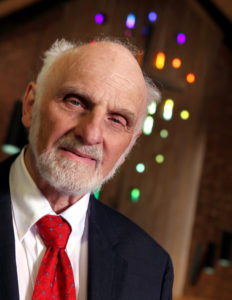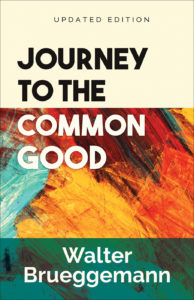Like so many others, I first learned about Walter Brueggemann’s astute way of illuminating the Old Testament when I attended a Bible Study group many years ago, as a young Christian. More recently, I re-discovered his writing on a website called Common Good Collective. The Collective facilitates events and conversations that bring together social innovators, community activists, and faith leaders. Their goal is to provide a space to discuss – and implement – both system and spiritual transformation, while weaving together three aspects into all that they do: the significance of place; the structure of belonging; and the elimination of economic isolation. I also read the book An Other Kingdom: Departing the Consumer Culture (John Wiley & Sons Publishers; 2016), co-written by Brueggemann and two other wise elders – Peter Block and John McKnight – who were all instrumental in founding the Common Good Collective. That book was a game-changer for me, and got me seriously thinking about the culture of addictive consumption in which too many of us are mired. It led to great discussions with friends and family, and some life-altering changes in my own consumer habits.
In 2010, Walter Brueggemann wrote a book called Journey to the Common Good (Westminster John Knox Press). It was written in a time of rebuilding in America because of the economic crash of 2008-09, and also a time of facing the fears and challenges in a new age of terrorism. His book offered a positive, constructive road map for our shared human journey. I was delighted to learn a few months ago that Brueggemann recently released an updated version of the book (Journey to the Common Good; Updated Edition; Westminster John Knox Press, 2021).
This new edition addresses social issues brought to light by the pandemic and the economic meltdown in its wake, as well as the ongoing racial injustice we are experiencing in our times. The book calls us to step away from the “grace-less contexts” of greed and separation, and instead work together for the common good. Brueggemann points out both the big and little actions that are needed, and reminds us of the significance and boundless consequences of active, caring neighbourhoods.
Though a short, concise book (144 pages) it is a powerful one, and delivers much to think about. Woven throughout the book are the Old Testament stories found in the books of Genesis and Exodus. The story of Joseph sets the stage for the Israelites’ experience as slaves in Pharoah’s Egypt, followed by their long wilderness sojourn led by Moses through the desert. In his usual fashion, Brueggemann is able to take Old Testament Scripture and make it very understandable, enlightening, and applicable to our present-day life. To break free of Pharaoh’s power and oppression, the Israelites had to trust in God’s abundance as they escaped from Egypt, and let go of the fear of scarcity they had learned under Pharaoh’s rule. In their journey through the barren wilderness they had more lessons to learn, such as how to listen to each other – as well as the vital importance to their survival of working together and focusing on the needs of everyone.
Brueggemann strongly advises that after the pandemic we cannot simply return to normalcy. Echoing the words of Isaiah, we can and must find our way forward into a new age, one that is rooted in inclusivity, hospitality and justice. As he leads us through these ancient Old Testament stories, he helps us experience them in new and intimate ways that speak volumes to our current lifestyles. Brueggemann also offers both hope and guidance, encouraging us all to live out the words of Jesus to love our neighbour as we love ourselves, thereby becoming guardians of the common good. In fact, he calls for nothing less than for us to embrace a subversive, alternative social ethic, one with specific economic implications, focused on care for the poor and the marginalized.









